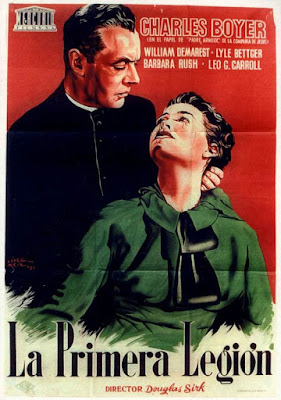Lots of religiosity (and answered prayers) in the films of Douglas Sirk, but only two set at religious institutions: the fortress-like Nunnery of THUNDER ON THE HILL/’51, with Christian iconography & churchly architecture ginning up a dark-and-stormy-night melodrama; and, right before it, this exceptionally interesting, if not entirely satisfying, Miracle Story, which takes place almost entirely inside a gated Jesuit institute. Emmet Lavery, adapting his own 1930s play, doesn’t fill in some missing pieces, crucial public reaction to a debunked miracle is skipped over, and you can feel the sticky ‘real’ miracle ending coming a mile away, but Sirk compensates by handling the community of ‘brothers’ and their touchy grievances with tough, clear-eyed irritation & sympathy. The initial crisis involves a Jesuit on the verge of leaving the community. Even advice from the experienced Father Charles Boyer won’t alter his course of action. But when ailing Father H.B. Warner has an apparently miraculous recovery from his death bed, it’s a game changer for all Doubting Thomases. And not only among the brothers. Once word gets out, their gated campus is suddenly overwhelmed as a destination pilgrimage for the desperate. While the Jesuits, something of a independent Black Sheep cult inside the church, see both opportunity and disruption. Worse, Boyer, the most worldly of the brothers, has an inkling the ‘miracle’ is based on a fraud. Not of the Father’s making, but from Lyle Bettger, the cynical doctor involved in his treatment. The hullabaloo, now adversely affecting a paralyzed patient the doctor cares about, Barbara Rush, suddenly a true believer in faith-based impossibilities. Alas, Rush not at her best in beatific moments, but characterizations are elsewise pretty high (William Demarest, Leo G. Carroll, Walter Hampden, Wesley Addy, George Zucco), with the film just growing more involving. Or does until that whopper of an ending.
DOUBLE-BILL: Operatically speaking, Poulenc’s DIALOGUE OF THE CARMELITES, composed five years after this film, shows weird, gender-switched similarities in plot & character. OR: Hitchcock’s underappreciated Catholic-confession suspenser I CONFESS/’53.



No comments:
Post a Comment